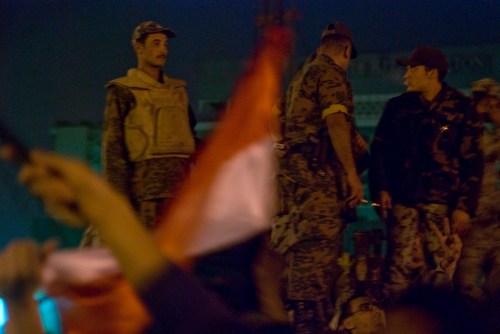This post was written in response to the events outside the Israeli embassy in Cairo on the night of May 15.
Today Israel killed at least 13 demonstrators on its borders with Lebanon and Syria. Demonstrators taking the opportunity of Nakba Day to draw attention to the historic ethnic cleansing of Palestinians in 1948 by the terrorist predecessor of the savage Israeli army had that brutality turned on them. Just as it was abhorrent to the Mubarak regime in Egypt for his corrupt police state to be challenged and just as it’s inconceivable for the Assad regime to contemplate giving up its ownership of Syria, Israel will not abide with having its right to brutally ride over bones challenged.
Tonight, Egyptian demonstrators were shot at as Egyptian soldiers wounded more than 300 and arrested 186 for bringing their anger to bear on the Israeli embassy. A facility whose very illegitimacy is made clear by the fact that it has to nestle on 15th floor of a residential building; Egyptians as a human shield inside and as canon fodder on the street below. But the ruling Supreme Council of the Armed Forces, Egypt’s de facto government since it pushed Mubarak aside on February 11, doesn’t have to worry about stirring a slumbering public opinion against it by shooting protesters. As a cursory look at the comments for this article in Dostour reporting the night’s events reveal, for many people it is “not the time for it [protests]”, so that justifies the army’s brazen brutality.
But more than that, by opening live fire on the protesters, the army has once again shown the sneer that crawls on its face when confronted by disobedient citizens. The same sneer with which Mubarak’s police state viewed us all. And under that contemptuous expression, lies the same dark vices of power. So how familiar is it with the other vices of the corrupt regime?
That the country’s fate is still in their hands despite the obvious diseased genes it shares with Mubarak’s regime is, among other factors, down to its apparent cleansing of public office and its tanks. The main course of action pursued by the military council since assuming power has been a visible uprooting of the corruption endemic through all state institutions from business and politics through to education and health. By cutting off the thirsty heads of this plant, the army has made it seem to have the best interests of the country at heart, throwing it into immediate contrast with the old regime. A convenient by-product, for the military, of this purge – or motivation in itself – is that it has rid itself of the robber baron free-marketers who undermined the generals’ place in the black heart of the Egyptian state.
That the investigations into all this illegally grabbed wealth is being conducted by the already existing Illicit Gains Authority gives undeserved legitimacy to a body that until now has been nothing more than a political tool used by the regime to target its opponents. A general-prosecutor, Mahmoud Abdel Meguid, once rendered bound and gagged by anti-corruption laws, or complicit in all that went on, is now revolutionary Egypt’s crusader against the previous regime’s crimes. But, as ever, his current masters are off-limits. And while the military council professes to have no interest in ruling in the future, it seems adamant to make use of its time in power to paint itself as part of the crusade despite having been chin deep in the pile before January 25.
New institutions are needed, but for now further reaching questions will suffice. Mubarak’s men sliced up the country’s assets and threw away its citizens’ futures without having to worry what the papers wrote. They could be explicit because their power had become absolute, their will and greed the winds of fate blowing poison heat around. But what of those out of sight? Amaney Jamal, the political science professor whose speculation on Hosni Mubarak’s wealth went viral around the world’s media, claims that he was cutting deals while still in the military, before he saw Sadat cut down by bullets. And with billions of American aid pouring into the army each year, in a general climate where corruption is a cup of tea, does it all go into weapons and training? How much is known about the generals sitting round that table and pushing Egypt’s course during this crucial interim period when the gains of the revolution can be entrenched or compromised?
But to find that out, you’d need watchdog agencies rather than the bloodhounds we have here. Sent out to catch its master’s prey.

